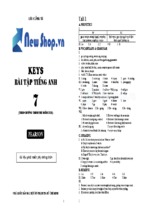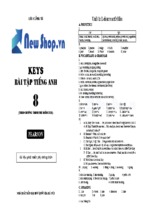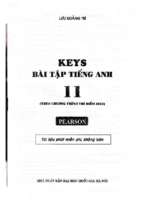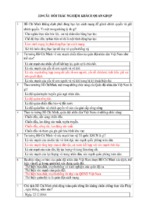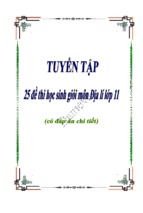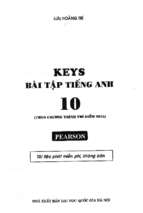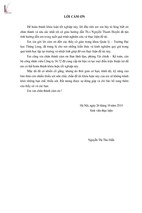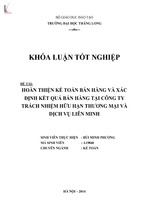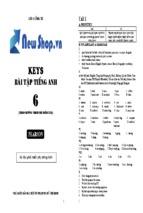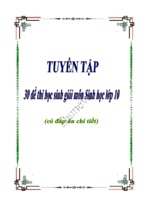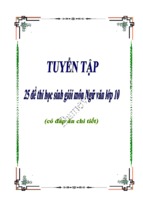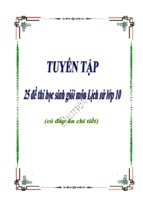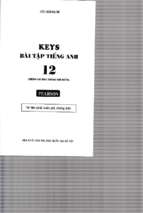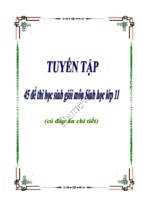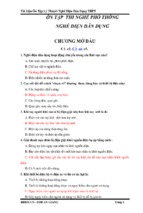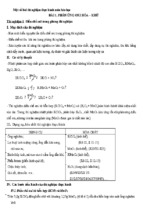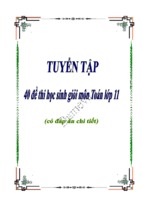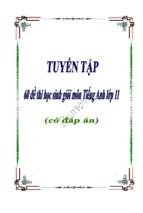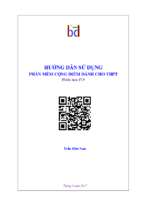SỞ GD&ĐT VĨNH PHÚC
ĐỀ CHÍNH THỨC
(Đề thi gồm 05 trang)
KỲ THI CHỌN HSG LỚP 10 THPT NĂM HỌC 2013-2014
ĐỀ THI MÔN: TIẾNG ANH
(Dành cho học sinh THPT chuyên)
Thời gian thi: 180 phút, không kể thời gian giao đề
PART A. LISTENING
I. You’ll hear two students, Ann and Chris talking about post graduate courses in music.
Listen and give short answer to the questions from 1 to 10. You will listen to the conversation
TWICE.
1. Which college does Chris suggest would be best?
2. What entry requirements are common to all colleges?
3. How much does the course at Leeds Conservatory of Contemporary Music cost?
4. What other expenses are payable to the colleges?
5. When is the deadline of The Academy in London?
Which facilities do the colleges have?
Choose five answers from the box and write the correct letter, A – G, next to questions 6-10.
Colleges
6. Northdown College
Facilities
7. The Academy in London
A. large garden
8. Leeds Conservatory and Contemporary Music
B. multiple sites
9. The Henry Music Institute
C. practice rooms
10. The James Academy of Music
D. recording studio
E. research facility
F. student carteen
G. technology suite
II. You will hear a conversation about technology.
Write NO MORE THAN THREE WORDS AND/OR A NUMBER for each answer. You will hear
the conversation TWICE.
The Antarctic Polar View project maps Antarctic sea ice by using (1) _________.
Problems to navigate through the water:
- the safety of the ship
- the speed of the ship
- the (2)________ of the ship
NVSAT Satellite: - Collect data
- Identify difference between open water and (3) ________.
Scientists can see surface of sea clearly by using (4) ________.
Helicopter:
- Advantage: - map the ice in the air
- look for (5) ________.
- Disadvantages: - much more difficulty
- (6) __________.
The colour of the map is (7) ____________.
Problems of sending pictures in Antarctic ship: (8) __________.
Measure to the problem: (9) ________ images into JPEG 2000 format.
The equipment scientists need for mapping is a (10) _________ on ship.
1
PART B. LEXICO - GRAMMAR
I. Complete each of the following sentences with the correct answer (A, B, C or D). Identify your answer
by writing the corresponding letter A, B, C or D on your answer sheet.
1. The audience couldn’t listen to the lengthy and pointless speech _________.
A. far any more
B. any longer
C. any more far
D. any lengthier
2. He missed two most important lectures. He _________very ill.
A. had to be
B. must be
C. was to be
D. must have been
3. Allan: “Do you mind if I use your dictionary?” Nick: “_______.”
A. I’m afraid not
B. Without doubt
C. No, feel free
D. Straight ahead
4. Oh, I’m always forgetting _______ these medicines. Is that before or after meal, Ron?
A. when to take
B. what I will take with
C. on which I should take
D. when I take
5. We rang the doorbell again _______ they hadn’t heard it the first time.
A. because
B. although
C. for fear of
D. in case
6. How boring the lecture was! I _______ just in the first half of it.
A. dropped off
B. fell out
C. called off
D. came out
7. Will it make any _______ to them if we deliver their equipment tomorrow?
A. displeasure
B. alteration
C. difference
D. conflict
8. What time are you _______ duty? Let’s have a coffee after that.
A. over
B. on
C. off
D. out of
9. Don’t give up your harboring dream. _______ working harder and harder.
A. Try out
B. Keep on
C. Speed up
D. Go off
10. It’s been a good year. I’ve written two books and a couple of articles, and _______ are now in print.
A. both of which
B. both of them
C. all of which
D. all of them
11. A: Why didn't you go to work yesterday?
B: I was feeling a bit ____________.
A. under the weather
B. full of hot air
C. breeze
D. under pressure
12. The closets are filled with things we don’t need. We should have a _______soon.
A. garage sale
B. rush hour
C. housekeeper
D. doggy bag
13. If you want to return the suit, you must bring the __________with you as proof of purchase.
A. note
B. recipe
C. prescription
D. receipt
14. Nancy and I had both bought exactly the same kind of school bag without knowing it. It was a
complete ____________.
A. luck
B. chance
C. fortune
D. coincidence
15. I think some modern designs are more like ________ of art.
A. works
B. makes
C. objects
D. jobs
16. Time will _________ whether I made a right choice or not.
A. see
B. say
C. know
D. tell
17. That kind of dress is the _________ of fashion these days.
A. height
B. top
C. head
D. lead
18. You are having problems now but I am sure things will change _________ the better soon.
A. on
B. to
C. by
D. for
19. Despite being a very good student, she didn’t fulfill her ________ later in life.
A. makings
B. potential
C. capacity
D. aptitude
20. If you _______ any problems when you arrive at the airport, give me a ring.
A. come about
B. catch on
C. run into
D. face up
II. There are 10 mistakes in the following passage. Find and then correct them. (0) have been
done for you.
Anthony Masters was a writer in exceptional gifts and prodigious energy. He began his eventful and
versatile career like a teenager, when he was expelled from school for organizing a revolt against the
2
school uniform. In order to earn a living, he fulfilled his childhood ambition and took on writing. In
1964, at the age of 23, he published A Pocketful of Rye, a collection of short stories where freshness of
style earned him a distinction of being runner – up in the John Llewellyn Rhys Memorial Prize, an
established and prestigious British – based literacy award. He made the award two years later with his
novel The Seahorse, after which he continued to display his considerable talent by writing both fiction
or non – fiction. The inspiration for many of his novels came from his experience helping the social
excluded: he ran soup kitchens for drug addicts and campaigned for the civic rights of gypsies and
another ethnic minorities. His non – fiction output was typically eclectic, ranged from biographies to
social histories, but it was a writer of children fiction that Masters outshone his contemporaries. His
work contains a sensitivity which remains unequalled by some other writer of the genre.
Answers: 0. in � of
III. Supply the correct form of the word in capital letter. Write your answers on your answer
sheet.
With the development of fast motorway systems in many countries, once remote parts of the
countryside are (1. INCREASE) _________ becoming (2. ACCESS) _________ to people who live in
towns and cities. In many parts of the world, rising (3. PERSON) _________ incomes have resulted in
mass (4. OWN) _________ of motor cars at a time when people have more leisure time to fill.
This means that there is a lot of (5. PRESS) _________ on the countryside to accept a growing
number of visitors. In Britain, for example, the (6. NATION) _________ parks are used by more than
one hundred million people annually.
In (7. ADD) _________, similar numbers visit areas that do not enjoy the same level of (8.
PROTECT) _________. Some people regard this invasion of the countryside as (9. DESIRE)
_________ and they have begun campaigning to try and save some aspects of (10. TRADITION)
_________ rural culture.
IV. Complete the following sentences with one preposition/particle for each blank.
1. That factory turns ________ hundreds of small appliances everyday.
2. The boss asked me to make _______ the hours I missed last week.
3. The suspect was released from prison _______ bail.
4. Once again poor Colin has been passed _______for promotion.
5. Everyone approved of the scheme, but when we asked for volunteers they all hung _______.
PART C. READING
I. Read the following passage and choose the best answer for each question. Identify your answer by
writing the corresponding letter A, B, C or D on your answer sheet.
Have you ever thought about the names of the months? Why are “January” and “February” not
called “Primo” or “Secondo”? Is it because the original names were created in ancient times? Or is it
because the originators preferred odd words?
Take February, for example. Say it aloud a few minutes and you start to wonder. Most people
don’t know who developed these names. However, a little research reveals that the names of the months
came mostly from a combination of the names of Roman gods and goddesses, important festivals, and
the original numbers of the months.
Julius Caesar and Pope Gregory XIII change the calendar to make it more exact. Caesar
developed a new calendar of 364 and a quarter days, the time it takes the earth to orbit the sun from one
spring season to the next. The Pope’s astronomers refined the calendar regarding leap years; they
determined that there should be no leap year in years ending in 00- unless they were divisible by 400;
the years 1700, 1800, 1900 and 2100 would not be considered leap years, while the years 1600 and 2000
would be. This new Gregorian calendar was so accurate that today, scientists need only add leap
seconds every few years to the clock in order to keep the calendar matching the Earth’s cycles.
3
1. What is the topic of the passage?
A. how the modern calendar was named and developed
B. how the months were named
C. how the leap year system was developed
D. how accurate the modern day is calendar
2. It can be inferred from paragraph 1 that the author think the names of the months are __________.
A. odd
B. difficult to pronounce
C. inappropriate
D. none of the answers
3. The word “they” in paragraph 3 refers to ______________.
A. calendars
B. days
C. astronomers
D. years
4. The word “accurate” in paragraph 3 is closest in meaning to ____________.
A. interesting
B. informative
C. correct
D. simple
5. Which of the following will be a leap year?
A. 2300
B. 2400
C. 2200
D. 2500
6. Which of the following is true of the Gregorian calendar?
A. It needs major improvements.
B. It was so well designed, it needs little adjusting today.
C. It copied the Roman calendar’s formula of leap years.
D. none of the answers
7. Why is Caesar important in calendar making?
A. He changed the length of the year .
B. He extended summer.
C. He has a month named for him.
D. He altered the number of days in the year.
8. In what order is the information in the passage presented?
A. Caesar’s calendar, the Gregorian calendar, the modern calendar
B. Roman Gods, important festivals, original numbers of months
C. names of months, Caesar’s calendar, the Gregorian calendar
D. none of the answers
9. The word “refined” in paragraph 3 is closest in meaning to ____________.
A. studied
B. invented
C. observed
D. improved
10. Why is the number of 364 and a quarter important?
A. It is the length of time from the beginning of spring to the end of winter.
B. It is the length of a planetary year.
C. It is the most accurate number for calendars.
D. It was a number randomly chosen by Caesar for his calendar.
II. Complete the following passage by choosing the correct option (A, B, C or D) to fill in blanks.
The Alexandra Palace in north London was built with private funds as a “People’s Palace”.
Serviced by its own station, it was opened in 1873 and was extremely well (1)_______ until, two weeks
after its opening, it burnt down. It was replaced by a slightly larger building which opened in 1875 and
featured, (2)________other things, a splendid organ an Great Hall, which was the size of a football
pitch. Despite the extraordinarily wide range of events (3)_______ there – from dog shows to great
concerts and banquets, from elephant displays to bicycle matches – it always operated at a loss and by
1877 much of the park around it had been sold to speculative builders, leaving only about half of the
original land.
In 1900, a committee was appointed, whose principal duty was to run the palace and park “for
the free use of the people forever.” There were, however, (4) ________ to charge for entry so that the
substantial costs could be (5) _______ . The Palace continued, with (6) ________ degrees of success, as
an entertainment centre. In the 1930s, it was probably most (7) ________ for being the home of the
world’s first high definition television broadcasts.
4
In 1980 the building was once more devastated by fire and (8) _______ to a ruin. It was then
decided to (9) _________ it and to create a major exhibition centre with community (10)_______, such
as a restaurant and a health club.
1. A. inhabited
B. attended
C. crowded
D. visited
2. A. among
B. between
C. from
D. around
3. A. performed
B. set
C. staged
D. laid
4. A. powers
B. terms
C. allowances
D. authorities
5. A. fulfilled
B. covered
C. matched
D. made
6. A. unsteady
B. varying
C. altering
D. unsettled
7. A. distinct
B. marked
C. considerable
D. notable
8. A. turned
B. converted
C. reduced
D. wrecked
9. A. recover
B. revise
C. restore
D. reform
10. A. facilities
B. conveniences
C. supplies
D. appliances
III. Read the text below and think of the word which best fits each space. Use only ONE word in
each space.
All tournament chess games are played with a chess clock – that is two clocks joined together.
When one player makes his move, he presses the button which stops his clock and starts his opponent’s
clock. (1)_________fails to keep the time limit, no (2)________ what the position on the board, loses
the game.
Weekend tournaments with a fast time limit and long sessions of play of (3)________ to
twelve hours a day are very strenuous and result in fatigue and time troubles. The play is quite sharp.
Active, attacking chess is the (4)________ of the day and it is difficult to maintain (5)_________
sustained, precise defense against such play. A score of the game must be (6)_________ as play goes on.
Each move is written down on a score sheet, which has to be handed to the tournament officials at the
end of each round. The only thought in everybody’s head is to win. Talent and youth – that’s
(7)_________ is needed for success at chess, with the (8)________ on youth. Some approach the board
with a slow, purposeful manner (9)________ giving you a second glance – you simply don’t count. The
seem to imply that the outcome is a foregone conclusion for them; you (10)_______ need to accept it
with good grace.
PART D. WRITING
I. Complete the second sentence so that it has the similar meaning to the first sentence. Write your
answers on your answer sheet.
1. Mr. Smith knew little about the Internet, so he didn’t invest into any computer companies.
Had _______________________________________________.
2. When she got to the party, everyone was dancing and singing.
On _______________________________________________.
3. Barbara runs a successful company and she also manages to look after her five children.
Not only __________________________________________.
4. Because of the traffic jam, Andrew couldn't get to the interview on time.
The traffic jam ______________________________________.
5. This old car probably won’t last for more than three years.
It’s unlikely ________________________________________.
II. Write a passage of about 250 words to show your opinion on the following statement:
“Some people believe that children’s leisure activities must be educational, otherwise they are a
complete waste of time”
---------------THE END--------------Thí sinh không được sử dụng tài liệu. Cán bộ coi thi không giải thích gì thêm.
Họ và tên thí sinh:…………………….………..…….…….….….; Số báo danh……………………
5
SỞ GD&ĐT VĨNH PHÚC
HƯỚNG DẪN CH ẤM
(Đề thi gồm 02 trang)
KỲ THI CHỌN HSG LỚP 10 THPT NĂM HỌC 2013-2014
ĐỀ THI MÔN: TIẾNG ANH
(Dành cho học sinh THPT chuyên)
Thời gian thi: 180 phút, không kể thời gian giao đề
Total: 100pts
PART A: LISTENING
I. You’ll hear two students, Ann and Chris talking about post graduate courses in music.
Listen and give short answer to the questions from 1 to 10. (5 pts)
1. The Henry Music Institute
2. a face-to-face interview/ an interview
3. 6,000 pound a year
4. the charges for applying/ application fee
5. January 30th
Which facilities do the colleges have?
Choose five answers from the box and write the correct letter, A – G, next to questions 6-10. (5pts)
6.E
7.B
8.C
9.G
10. D
II. You will hear a conversation about technology.
Write NO MORE THAN THREE WORDS AND/OR A NUMBER for each answer. (10pts)
1. satellites
6. time consumption
2. efficiency
7. (shades of) grey
3. (the) sea ice
8. (poor) Internet connection
4. radar
9. compress
5. leads
10. laptop
PART B. LEXICO - GRAMMAR
I. Complete each of the following sentences with the correct answer (A, B, C or D). (10pts)
1. B
2. D
3. C
4. A
5. D
6. A
7. C
8. C
9. B
11. A
12. A
13. D
14. D
15. A
16. D
17. A
18. D
19. B
10. D
20. C
II. There are 10 mistakes in the following passage. Find and then correct them. You should also
write the line of the mistakes. (10pts)
Qs
Mistake
Correction
1
like
as
2
on
up
3
where
whose
4
made
won
5
or
and
6
social
socially
7
another
other
8
ranged
ranging
9
children
children’s
10
some
any
6
III. Supply the correct form of the word in capital letter. Write your answers on your answer
sheet. (5 pts)
1. increasingly
2. accessible
3. personal
4. ownership
5. pressure
6. national
7. addition
8. protection
9. undesirable
10. traditional
IV. Complete the following sentences with one preposition/particle for each blank. (5 pts)
1. out
2. up
3. on
4. over
5. back
PART C. READING
I. Read the following passage and choose the best answer for each question. Identify your answer by
writing the corresponding letter A, B, C or D on your answer sheet. (10pts)
1. A
2. A
3. C
4. C
5. B
6. B
7. A
8. C
9. D
10. B
II. Complete the following passage by choosing the correct option (A, B, C or D) to fill in blanks.
(10 pts)
1. B
2. A
3, C
4, A
5. B
6. B
7. D
8. C
9. C
10. A
III. Read the text below and think of the word which best fits each space. Use only ONE word in
each space. Write your answers on your answer sheet. (10pts)
1. whoever/who
2. matter
3. up
4. order
5. a/any
6. kept
7. what
8. emphasis
9. without
10. only
PART D: WRITING
I. Complete the second sentence so that it has the similar meaning to the first sentence. (5pts)
1. Had Mr. Smith known something / more / a little more / some more about the Internet, he would have
invested into some computer companies.
2. On her arrival at the party, everyone was dancing and singing.
3. Not only does Barbara run a successful company, but she also manages to look after her five children
/but she manages to look after her five children as well.
4. The traffic jam prevented Andrew from getting to the interview on time.
5. It is unlikely that this old car will last for more than three years.
II. Write a passage of about 250 words to show your opinion on the following statement:
“Some people believe that children’s leisure activities must be educational, otherwise they are a
complete waste of time” (15pts)
Marking scheme
The impression mark given is based on the following scheme:
1. Content: 50% of total mark: a provision of all main ideas and details as appropriate
2. Language: 30% of total mark: a variety of vocabulary and structures appropriate to the level of
English language gifted upper-secondary school students
3. Presentation: 20% of total mark: coherence, cohesion, and style appropriate to the level of
English language gifted upper-secondary school students.
---------------THE END-------------
7
SỞ GD&ĐT VĨNH PHÚC
—————
ĐỀ CHÍNH THỨC
(Đề thi có 5 trang)
KỲ THI CHỌN HSG LỚP 11 THPT NĂM HỌC 2011-2012
ĐỀ THI MÔN: TIẾNG ANH
Dành cho học sinh các trường THPT không chuyên
Thời gian làm bài: 180 phút, không kể thời gian giao đề
————————
PART I. LISTENING
Susan comes to Barclays Bank and talks to a bank clerk. Listen to their conversation. Complete the
following statements by filling in the relevant words. You should use no more than THREE words.
You will listen to the conversation TWICE.
Susan will be a (1) _______ student.
She wants to keep her money in a safe place with easy (2) _______.
She is suggested to open an (3) _______ Account.
The facilities the current account provides are (4) _______ and a deposit book.
There are (5) _______ of interest for this account.
If the balance is up to 500 pounds, the interest is (6) _______.
If the balance is over 500 pounds, the interest goes up to (7) _______.
The bank statement shows you the permanent record of income and (8) _______.
Cashcard can be used to (9)_______ and (10) _______ the balance.
PART II. GRAMMAR AND VOCABULARY
I. Complete the following sentences by choosing the correct answer among four options (A, B, C or
D).
1. She looked very______ when I told her the good news.
A. happily
B. happiness
C. happy
D. was happy
2. I don't want much sugar in my coffee. Just_______, please.
A. few
B. a few
C. little
D. a little
3. He's left his book at home; he's always so______.
A. forgetful
B. forgettable
C. forgotten
D. forgetting
4. 'I'm very ______ to you for putting in so much hard work,' the boss said.
A. thanking
B. grateful
C. considerate
D. careful
5. Steel_______ with chromium to produce a noncorrosive substance known as stainless steel.
A. is combined
B. that is combined C. combining
D. when combined
6. Joe seemed to be in a good mood, ________ he snapped at me angrily when I asked him to join us.
A. yet
B. so
C. for
D. and
7. A fire must have a readily available supply of oxygen. ________, it will stop burning.
A. Consequently
B. Furthermore
C. Otherwise
D. However
8. “Who has brothers and sisters?”
“Everyone ________Virginia who’s an only child.”
A. except to
B. with
C. from
D. but
9. He is the manager of the factory. He’s ________it.
A. charged with
B. charged
C. in charge
D. in charge of
10. He was new on the job, but he quickly fit himself into the ________ routine of the office.
A. establishing
B. established
C. establishes
D. establish
11. Florida, ________ the Sunshine State, attracts many tourists every year.
A. is
B. is known as
C. known as
D. that is known as
12. ________becoming extinct is of great concern to zoologists.
A. That giant pandas are
B. Giant pandas are
C. Are giant pandas
D. Giant panda is
13. Her parents gave her everything she asked for. She's a completed _______ child.
A. wounded
B. spoilt
C. damaged
D. destroyed
14. _______ my experience, very few people really understand the problem.
A. To
B. In
C. With
D. From
15. When she died, she gave _________ all her money to a charity for cats.
A. away
B. out
C. on
D. off
II. Complete the following passage by supplying the correct form of the word to fill in each blank.
The increase in city crime is a global phenomenon. Some people say that a lot of crime in this
country is because of (1 - migrate) ______ and the new people arriving from other countries bring different
(2 - culture) ______ values and attitudes to the law. I don’t agree with this idea because the most common
crimes are (3 - local) ______ produced and not imported from other countries. (4 - Vandal) ______ is one
of the biggest crimes in my city with bus shelters and shop windows being popular targets. Another popular
crime is (5 - pay) ______ parking fines, which is unlikely to be because of immigrants because most of
them do not own cars. The (6 - oppose) ______ point of view is that young local people feel angry when
they can’t get a job and in order to (7 - hand) ______ the change in their environment, they strike out at
easy targets. This would explain why bicycle (8 - thief) ______ is more common than car crime these days,
especially in rich (9 - neighbors) ______ where most cars are protected with electronic alarms. Another
reason, though, for so many bicycles getting stolen might be that the (10 - punish) ______ is not very
severe compared to car stealing which can land you in prison for a number of years.
III. Fill in each blank with one suitable preposition.
1. Most American men earn _______ average about $110 a week.
2. He was walking through the park when a strange dog suddenly went _______ him.
3. My car is not worth much _______ most $ 50.
4. I’d better not drink that milk, Joe. It’s gone _______.
5. Clive was really cut _______ when he failed his proficiency exam.
IV. Identify the error in each sentence. Write the corresponding letter A, B, C or D on the answer
sheet.
1. The children forgot picking up the note from the office and now they are worried.
A
B
C
D
2. Helen has never met such good person who is ready to help others.
A
B
C
D
3. If only I have done the test better than other students did.
A
B
C
D
4. If you want to borrow my car, promise to drive careful.
A
B
C
D
5. Rumors began circulating that the Prime Minister was seriously illness.
A
B
C
D
6. Everybody in class has to choose a topic of your own to write an essay of 500 words.
A
B
C
D
7. Neither of the boys had ever been out of town before, so they were really exciting.
A
B
C
D
8. I hope that I can help you with the historic questions.
A B
C
D
9. My son learned to talk the time before he was 5 years old.
A
B
C
D
10. Jim offered us presents as if it had been Xmas.
A
B
C
D
PART III: READING
I. Read the passage carefully, then choose the correct option (marked A, B, C or D) to answer the
questions.
Million of people are using cell phones today. In many places, it is actually considered unusual not
to use one. In many countries, cell phones are very popular with young people. They find that the phones
are means of communication – having a mobile phone shows that they are cool and connected.
The explosion in mobile phone use around the world has made some health professionals worried.
Some doctors are concerned that in the future many people may suffer health problems from the use of
mobile phones. In England, there has been a serious debate about this issue. Mobile phone companies are
worried about the negative publicity of such ideas. They say that there is no proof that mobile phones are
bad for your health.
On the other hand, medical studies have shown changes in the brain cells of some people who use
mobile phones. Signs of change in the issues of the brain and head can be detected with modern scanning
equipment. In one case, a traveling salesman had to retire at young age because of serious memory loss. He
couldn't remember even simple tasks. He would often forget the name of his own son. This man used to
talk on his mobile phone for about six hours a day, every day of his working week, for a couple of years.
His family doctor blamed his mobile phone use, but his employer's doctor didn't agree.
What is it that makes mobile phones potentially harmful? The answer is radiation. High – tech
machines can detect very small amounts of radiation from mobile phones. Mobile phone companies agree
that there is some radiation, but they say the amount is too small to worry about.
As the discussion about their safety continues, it appears that it's best to use mobile phones less
often. Use your regular phone of you want to talk for a long time. Use your mobile phone only when you
really need it. Mobile phones can be very useful and convenient, especially in emergencies. In the future,
mobile phones may have a warning label that says they are bad for your health. So for now, it's wise not to
use your mobile phone too often.
1. According to the passage, cell phones are especially popular with young people because ______.
A. they are indispensable in everyday communication
B. they make them look more stylish
C. they keep the users alert all the time
D. they cannot be replaced by regular phones
2. The changes possible caused by the cell phones are mainly concerned with______.
A. the mobility of the mind and the body
B. the smallest units of brain
C. the arteries of the brain
D. the resident memory
3. The word "means" in the passage most closely means _______.
A. meanings
B. expression
C. method
D. transmission
4. The word "potentially" in the passage most closely means _______.
A. obviously
B. possibly
C. certainly
D. privately
5. "Negative publicity" in the passage most likely means _______.
A. information on the lethal effects of cell phones
B. widespread opinion about bad effects of cell phones
C. the negative public use of cell phones
D. poor ideas about the effects of cell phones
6. Doctors have tentatively concluded that cell phones may _______.
A. damage their users' emotions
B. cause some mental malfunction
C. change their users' temperament
D. change their users' social behavior
7. The man mentioned in the passage, who used his cell phone too often _______.
A. suffered serious loss of mental ability
B. could no longer think lucidly
C. abandoned his family
D. had a problem with memory
8. According to the passage, what makes mobile phones potentially harmful is ______.
A. their radiant light
B. their power of attraction
C. their raiding power
D. their invisible rays
9. According to the writer, people should _______.
A. only use mobile phones in urgent cases
B. only use mobile phones in medical emergencies
C. keep off mobile phones regularly
D. never used mobile phones in all cases
10.The most suitable title for the passage could be ______.
A. "The reasons why mobile phones are regular"
B. "Technological Innovation and their price"
C. "They way mobile phones work"
D. "Mobile phones – a must of our time"
II. Complete the following passage by choosing A, B, C or D to fill in each blank.
Stamp collecting! What a wonderful hobby! I began when I was only five. I used to (1) ______ for
the postman's arrival, always (2) ______ to seize unwanted envelopes and tear off the corner with the stamp
stuck on it.
Once – I remember it was too clearly – my mother and father were sunning themselves in the
garden when the post (3) _____ on the doormat. I heard the clatter of the letter flap and hurriedly went to
(4) ______. There were four or five envelops, all with very exciting stamps.
Even at the (5) ______ age of five I knew one doesn't open mail addressed to other people.
However, tearing just the corners off the envelops (6) ______ me as perfectly fair and allowable, and just
what I did. I carefully tore as (7) ______ to the stamps as (8) _______, feeling that even the envelopes,
which were addressed to my parents and not to be, should be treated with (9) _______.
There were nothing furtive in what I did. I knew my parents would see what I'd done, and I didn't
think there was any (10) ______ in it. They always let me (11) ______ the corners after they'd opened
them. Why should I think there was any harm in doing it first, (12) ______ in mind that they weren't on
hand to be (13) ______. Wouldn't they rather be left to doze in their summer deckchairs?
(14) ______, though, my father solemnly showed me his letters. They looked distinctly moth-eaten,
with bites taken out of the corners and sites. I began to (15) ______ what I've done.
1. A. stare
B. watch
C. look
D. peer
2. A. glad
B. pleased
C. eager
D. excited
3. A. came
B. was
C. lay
D. arrived
4. A. investigate
B. observe
C. see
D. notice
5. A. junior
B. tender
C. small
D. little
6. A. struck
B. seemed
C. appeared
D. felt
7. A. nearby
B. close
C. next
D. round
8. A. able
B. possibly
C. possible
D. could
9. A. gentleness
B. caution
C. honor
D. respect
10. A. trouble
B. wrong
C. bad
D. harm
11. A. take
B. tear
C. cut
D. remove
12. A. having
B. holding
C. bearing
D. keeping
13. A. consulted
B. advised
C. queried
D. requested
14. A. After
B. Then
C. Later
D. Soon
15. A. accept
B. realize
C. admit
D. confess
III. Read the following passage and answer the questions that follow. Write A, B, C or D to indicate
your answers on the answer sheet.
Every drop of water in the ocean, even in the deepest parts, responds to the forces that create the
tides. No other force that affects the sea is so strong. Compared with the tides, the waves created by the
wind are surface movements felt no more than a hundred fathoms below the surface. The currents also
seldom involve more than the upper several hundred fathoms despite their impressive sweep.
The tides are a response of the waters of the ocean to the pull of the Moon and the more distant Sun.
In theory, there is a gravitational attraction between the water and even the outermost star of the universe.
In reality, however, the pull of remote stars is so slight as to be obliterated by the control of the Moon and,
to a lesser extent, the Sun. Just as the Moon rises later each day by fifty minutes, on the average, so, in most
places, the time of high tide is correspondingly later each day. And as the Moon waxes and wanes in its
monthly cycle, so the height of the tide varies. The tidal movements are strongest when the Moon is a sliver
in the sky, and when it is full. These are the highest flood tides and the lowest ebb tides of the lunar month
and are called the spring tides. At these times the Sun, Moon, and Earth are nearly in line and the pull of the
two heavenly bodies is added together to bring the water high on the beaches, to send its surf upward
against the sea cliffs, and to draw a high tide into the harbors. Twice each month, at the quarters of the
Moon, when the Sun, Moon and Earth lie at the apexes of a triangular configuration and the pull of the
Sun and Moon are opposed, the moderate tidal movements called neap tides occur. Then the difference
between high and low water is less than at any other time during the month.
1. What is the main point of the first paragraph?
A. The waves created by ocean currents are very large.
B. Despite the strength of the wind, it only moves surface water.
C. Deep ocean water is seldom affected by forces that move water.
D. The tides are the most powerful force to affect the movement of ocean water.
2. The words "In reality" in the passage is closest in meaning to
A. surprisingly
B. actually
C. characteristically D. similarly
3. It can be inferred from the passage that the most important factor in determining how much gravitational
effect one object in space has on the tides is
A. size
B. distance
C. temperature
D. density
4. The word "configuration" in the passage is closest in meaning to
A. unit
B. center
C. surface
D. arrangement
5. Neap tides occur when
A. the Sun counteracts the Moon's gravitational attraction
B. the Moon is full
C. the Moon is farthest from the Sun
D. waves created by the wind combine with the Moon's gravitational attraction
PART IV. WRITING
I. Write the new sentences using the word give. Do not change the word given in any way.
1. We are afraid that the next train to Cardiff has been cancelled.
REGRET
We ________________________ the next train to Cardiff has been cancelled.
2. 'I was going to phone Sarah but I had too much homework to do', said John
MEANT
John said that ___________________ but he'd had too much homework to do.
3. Many people think that Gone with the Wind is one of the greatest films ever made.
BE
Gone with the Wind _________________ one of the greatest films ever made.
4. If you hold your breath for a few seconds it might get rid of your hiccups.
HOLDING
You might be able to get rid of your hiccups if you _____________ for a few seconds.
5. Anna didn't like it at all when one of her colleagues got the promotion instead of her.
RESENTED
Anna _____________________ the promotion instead of her.
6. I have a good relationship with my neighbors.
ON
My neighbors __________________well together.
7. It wasn't a good idea for me to spend all my money on beer and cigarettes, but I did.
UP
I wish ________________________ my money on beer and cigarettes.
8. The police left and then all the journalists arrived.
ALREADY
The police ____________________all the journalists arrived.
9. Although Sarah wasn't wearing a helmet, she wasn't injured in the accident.
OF
Sarah wasn't injured in the accident, ______________ a helmet.
10. She felt she had achieved a lot in life, despite her disadvantaged background.
SENSE
Despite her disadvantaged background, she felt _______________ about her life.
II. Write a complete letter using the given word/phrases as cues. You should change the form of
words if necessary.
1. Thank/ much/French/ cookery book/ you/ give/ me.
2. recipes/ look/ wonderful/, and/ I/ certainly/ enjoy/ use/ it.
3. I/ hope/ you/ and/ Auntie Susan/ have/ good/ Christmas.
4. we/ stay/ at/ home/, but/ have/ couple/ day/ trips/ out/ nearby.
5. our/ local/ theatre/ put/ on/ production/ "A Christmas Carol"/, which/ fun.
6. I/ go/ back/ University/ next/ week/, and/ this/ year/ I/have/ to/ study/ hard/ final/ exams.
7. I/ really/ enjoy/ the/ course/ so/ far/, but/ I/ not/ sure/ what/ do/ once/ I/ get/degree.
8. university/ arrange/ career/ interviews/, but/ I/ not/really/ have/clear/ idea/what/ I/ want/ do.
9. hopefully/ it/ all/ become/ clearer/ during/ course/ the/ year.
10. Thank/ again/ lovely/ present/, and/ Happy/ New/ Year/
— The end —
Cán bộ coi thi không giải thích gì thêm!
SỞ GD&ĐT VĨNH PHÚC
—————
KỲ THI CHỌN HSG LỚP 11 THPT NĂM HỌC 2011-2012
HƯỚNG DẪN CHẤM MÔN: TIẾNG ANH
Dành cho học sinh các trường THPT không chuyên
PART I. LISTENING (15 pts: 1,5/item
1. college
2. access
3. Instant
4. a cashcard
6. 5.25%
7. 7.25%
8. expenditure
9. withdraw money
PART II. GRAMMAR AND VOCABULARY (35pts)
I. (15pts: 1/item)
1. C
2. D
3. A
4. B
6. A
7. C
8. D
9. D
11. C
12. A
13. B
14. B
II. (10pts: 1/item)
1. immigration
3. locally
5. unpaid
7. handle
2. cultural
4. vandalism
6. opposing
8. theft
III. (5pts: 1pt/item)
1. on
2. for
3. at
4. off
IV. (5pts: 0.5 pt/ item)
5. A
10. B
15. A
1. A
2. B
3. A
4. D
PART III. READING (30 pts)
I. (10pts: 1/item)
1. A
2. C
6. B
7. D
II. (15pts: 1/item)
1. B
2. C
6. A
7. B
11. D
12. C
III. (5pts: 1pt/item)
1. D
2. B
5. two levels
10. check
9. neighborhoods
10. punishment
5. up
5. D
6. C
7. D
8. D
9. B
10. D
3. C
8. A
4. B
9. A
5. B
10. B
3. D
8. C
13. A
4. A
9. D
14. C
5. B
10. D
15. B
3. B
4. D
5. A
PART IV. WRITING (20pts)
I. (10pts: 1/item)
1. regret to inform/to tell you/announce that
2. he had meant to phone Sarah
3. is considered/thought to be
4. try holding your breath
5. resented one of her colleagues getting
6. and I get on
7. I hadn't used up
8. had already left when/before
9. in spite of not wearing
10. a sense of achievement
II. (10pts: 1pt/item)
1. Thank you very much for the French cookery book you gave me.
2. The recipes look wonderful, and I'll certainly enjoy using it.
3. I hope you and Auntie Susan had a good Christmas.
4. We stayed at home, but had a couple of day trips out nearby.
5. Our local theatre put on a production of "A Christmas Carol", which was fun.
6. I am going back to University next week, and this year I'm going to have to study hard for the final
exams.
7. I've really enjoyed the course so far, but I'm not sure what to do once I get my degree.
8. The University arranges career interviews, but I don't really have a clear idea of what I want to do.
9. Hopefully it will all become clearer during the course of the year.
10. Thank you again for the lovely present, and Happy New Year!
Susan comes to Barclays Bank and talks to a bank clerk. Listen to their conversation.
Clerk: Good morning. What can I do for you?
Susan: Good morning. I’d like to open a bank account.
Clerk: What kind of account do you want?
Susan: I’m not quite sure. I’ll be a college student. I simply require a safe place to keep my money and easy
access to it. Can you recommend an account for me?
Clerk: All right. Do you get a grant?
Susan: No. I will be supporting myself.
Clerk: I see. You could open an Instant Account.
Susan: What’s an Instant Account?
Clerk: Basically, it’s an interest account. It has all the usual current account facilities such as cashcard and
a deposit book, except a chequebook, and pays competitive interest on your account when it’s in credit.
There are two levels of interest for this account. If your balance is up to five hundred pounds, the interest is
five point two-five percent. If your balance is five hundred or over, it attracts an even higher rate of interest
which goes up to seven point two – five percent. You will receive a cashcard for our machines, so you can
withdraw money with the card from any machines at any Barclays branches when the bank is closed.
Susan: Oh, I see. How can I withdraw money if I have no chequebook?
Clerk: Well, you have to withdraw money either using your card or visiting your branch.
Susan: I see. How can I find out how much money I have in my account?
Clerk: You can ask your branch and tell them how often you would like to receive your statement, which
provides you with a permanent record of income and expenditure. It will show every transaction on your
account and the balance remaining at the end of each day. You also can see your cashcard to check your
balance.
Susan: That’s fine. I think I’ll open an Instant Account.
SỞ GDĐT BẠC LIÊU
KỲ THI CHỌN HSG LỚP 10, 11 VÒNG TỈNH
NĂM HỌC 2011 - 2012
ĐỀ CHÍNH THỨC
(Gồm 07 trang)
* Môn thi: TIẾNG ANH
* Lớp: 11 (Bảng A)
* Thời gian: 180 phút (Không kể thời gian giao đề)
ĐỀ
PART 1. LISTENING (2 points)
You will hear a talk about the changes in the American Family . Fill in the blanks with the
relevant information in the outline . You will hear twice.
OUTLINE
Changes in the American Family
* Introduction
A. Traditional American family: working father , (1)……….…and two or three (2)
…………..
B. Examples of new kinds of families:
- Single mothers and fathers.
- Married (3)………………. without children.
- Young (4) ………………. return to live with their parents.
- Older people sharing house to (5) …………………………….
* Social and economic reasons for change in the traditional family.
- The (6)………………… rate is (7)……………………….
- Unemployment among (8) ………………….adults.
- Most important: (9)…………………………………………work outside the home.
(10) …………………% of American women now working.
PART 2. PHONETICS
I. Circle the correct answer (A, B, C or D) that has the underlined letter(s) pronounced
differently from the rest (1 point).
1. A. luxury
B. example
C. exist
D. exempt
2. A. diving
B. discover
C. discipline
D. divide
3. A. imagined
B. released
C. rained
D. followed
4. A. some
B. come
C. love
D. home
5. A. than
B. theater
C. theory
D. thorough
II. Circle the correct answer (A, B, C or D) whose main stress is placed differently from
the others (1 point)
1. A. evaluate
B. favorable
C. convenient
D. relationship
2. A. favorable
B. talkative
C. successful
D. beautiful
3. A. company
B. official
C. Australia
D. encounter
4. A. package
B. customer
C. supervisor
D. accountant
5. A. harvest
B. circumstances
C. produce
D. ceremony
1
PART 3. LANGUAGE FOCUS
I. Circle the best answer (A, B, C or D) to complete each of the sentences below. (1
point).
1. Staying in a hotel costs ………renting a room in a dormitory for a week.
A. twice more than
B. twice as much as
C. as much twice as
D. as much as twice
2. If you had taken my advice you …………in such difficulties now.
A. won’t be
B. hadn’t been
C. wouldn’t be
D. aren’t
3. Aristotle, one of the greatest natural philosophers, …………., the leading cultural and
intellectual city in Greece.
A. of Athens
B. living in Athens
C. he lived in Athens
D. lived in Athens
4. I need eight hours’ sleep a night, …………my brother gets by on only five or six.
A. except
B. however
C. whereas
D. because
5. “Penny is an excellent actor!” “That goes without saying. If only she ……….to take a part
in our new play!”
A. agreed
B. would agree
C. had agreed
D. was agreeing
6. “I think the amount of money in my account is incorrect.”
“ You are right, sir. I’m afraid it’s a mistake ………….by one of our employees.”
A. made
B. is made
C. has been made
D. had been made
7. You …………to water the lawn. I think it’s going to rain later.
A. need not
B. don’t must
C. don’t need
D. must not
8. “Why is Terri calling the police?” “She has ………….and she’s hoping they can find it.”
A. had her car stolen
B. had stolen her car
C. had to steal her car
D. her car was stolen
9. I have never felt better than I do now.
A. I feel well now
B. I felt better before
C. I have never felt well
D. I have always felt well
10. Of all the candidates, Jane is probably ………….
A. the less qualified
B. the qualified less
C. the most little qualified
D. the least qualified
II. Choose the best option (A, B, C or D) to complete the passage below. (1 point)
The telephone was invented in 1876 by Alexander Graham Bell, a Scotsman who
became a US citizen. The word “telephone” had been (1)…………existence since the 1830s
and had been (2)…………to a number of inventions designed to produce sound.
Bell had become interested in the possibility of long-distance speech through his work
with the deaf. He was twenty-eight and his assistant, Thomas Watson, was
(3)…………twenty-one when they (4)…………their great success on 10th Match 1876.
Despite their long and close association, Bell’s first communication by telephone was not
“Tom, come here, I want you”. (5)………… “Mr. Watson, come here, I want you”.
(6)…………with excitement, Bell and Watson demonstrated their invention to a US
telegram company. The company wrote to Bell, saying that his invention was interesting.
However, after (7)…………it careful consideration, they had (8)…………to the conclusion
that it had “no future”. Fortunately for Bell, others could see the possibilities. Within fours
years of its invention, the US had 60,000 telephones. In the next twenty years that
(9)…………increased to over 6 million.
Today, ninety-three per cent of US homes have a telephone, a level of phone
ownership no other nation comes near to equaling. Each US household makes or receives
(10)…………average 3,516 calls per year, an astonishing statistic.
1. A. in
B. with
C. to
D. out
2. A. joined
B. named
C. employed
D. applied
3. A. quite
B. just
C. simply
D. lately
2
4. A. managed
B. achieved
C. succeeded
5. A. But
B. Otherwise
C. Instead
6. A. Whole
B. Deep
C. A. Entire
7. A. regarding
B. giving
C. taking
8. A. reached
B. A. come
C. arrived
9. A. figure
B. count
C. measure
10. A. on
B. by
C. at
III. Put the words in brackets into the correct forms. (1 point)
1. He really needs a (confide) …………………secretary.
D. fulfilled
D. Although
D. Filled
D. bearing
D. brought
D. extend
D. for
2. He doesn’t know much about the subject, but he’s very (enthusiasm) ………………………
3. Don’t be so (child) ………………………
4. This rule do not apply (universe) …………………………
5. The artist has performed a (spectacular)………………………attractive dance.
IV. Supply the correct verb forms of the verbs in brackets. (1 point)
serve
include
hope
flourish
found
visit
enlarge
come
The Singapore Botanical Gardens, (1) …………..……… in 1859, is one of the
leading tropical gardens in the world. It attracts over twenty thousand visitors weekly. Some
of these visitors travel from countries as far as France. Besides (2) …………..…….. as a
public park, it is also a center for research on plant growth and improvement. Currently, over
three thousand species of plants (3) …………………….. in the gardens. This collection is
expanded by exchange and donations. Tourists (4) ……………….….. the gardens can also
expect to see several varieties of orchids, (5) ……….……..….. the national flower - the
Vanda Miss Joaquim.
V. Choose the right phrasal verbs provided in the box, then use their most suitable
forms to complete the sentences below. (1 point)
wash out – look after – track down – dip into
press on – clear off – dry up – go off – doze off
1. My speech started well, but I …………………………... after a few minutes.
2. She had such a bad cold that I was not surprised she ………….………….….. in the middle
of the afternoon.
3. He had no business there, so I told him …………..….. ………………
4. Nurses who ……………………..…… old people have a very difficult job.
5. The gun …………………………. in his hand while he was clearing it.
VI. Finish each of the following sentences in such a way that it means exactly the same as
the sentence printed before it (1.5 points)
1. Richard only took over the family business because his father decided to retire early.
Æ But for ………………………………………………………………………………...
3
2. He hasn’t been back to his hometown for over twenty years now.
Æ It is ………………………………………………………………………………........
3. I only recognized him when he came into the light.
Æ Not until ………………………………………………………………………………
4. ‘I’m sorry, Angela,’ said Martin, ‘I’m afraid I’ve damaged your car.’
Æ Martin apologized ……………………………………………………………………
5. I thought that George’s last novel was more interesting.
Æ George’s latest novel …………………………………………………………………
VII. Rewrite the second sentence so that it has a similar meaning to the first one, using
the word given. Do not change the word given. (1.5 points)
1. All teachers like Mary. (POPULAR)
Æ ………………………………………………………………………………......................
2. The two theories appear to be completely different. (COMMON)
Æ ………………………………………………………………………………......................
3. I found the story she told me very interesting. (FASCINATED)
Æ ………………………………………………………………………………......................
4. The rain was coming down in torrents. (CATS)
Æ ………………………………………………………………………………......................
5. You must be on time for your interview. (ESSENTIAL)
Æ ………………………………………………………………………………......................
PART 4. READING
I. Read the text below and think of the word which best fits each space. (1 point)
Sailors have a special place in English history, and many are remembered as national (1)
……………... If you visit London, you will probably see a large square in Central London
called Trafalgar Square. Here stands a large (2) ……………..of Lord Nelson, an English
sailor who was killed in a battle with the French navy at Trafalgar. (3) …………….. he was
killed in this battle, the British navy proved stronger than the French, and so (4)
……………..sure that the great French army of Napoleon Bonaparte could not invade
England. So still today the statue of Nelson, (5) …………….. of England's greatest sailors,
stands at the heart of London's most famous and popular square.
It is not surprising that the first Englishman (6) ……………..visit Japan was also a sailor. His
name was Will Adams, and he was the pilot (navigator) of a Dutch trading ship which was
shipwrecked on the coast of Japan (7) ……………..the year 1598. Adams in fact remained in
Japan for the (8) ……………..of his life, and became a successful businessman. He was
employed by the Shogun Ieyasu as an adviser on shipbuilding and foreign affairs, and was
known by the (9) …………….."Anjin-san". He was buried in Hemi, where his (10)
4
……………..can still be seen today. There is also a memorial to Will Adams in his home
town of Gillingham, in England.
II. Read the passage below and circle the best answer (A, B, C or D) to each question. (2
points)
Most people can remember a phone number for up to thirty seconds. When this short amount
of time elapses, however, the numbers are erased from the memory. How did the information
get there in the first place? Information that makes its way to the short term memory (STM)
does so via the sensory storage area. The brain has a filter which only allows stimuli that is of
immediate interest to pass on to the STM, also known as the working memory.
There is much debate about the capacity and duration of the short term memory. The most
accepted theory comes from George A. Miller, a cognitive psychologist who suggested that
humans can remember approximately seven chunks of information. A chunk is defined as a
meaningful unit of information, such as a word or name rather than just a letter or number.
Modern theorists suggest that one can increase the capacity of the short term memory by
chunking, or classifying similar information together. By organizing information, one can
optimize the STM, and improve the chances of a memory being passed on to long term
storage.
When making a conscious effort to memorize something, such as information for an exam,
many people engage in "rote rehearsal". By repeating something over and over again, one is
able to keep a memory alive. Unfortunately, this type of memory maintenance only succeeds
if there are no interruptions. As soon as a person stops rehearsing the information, it has the
tendency to disappear. When a pen and paper are not handy, people often attempt to
remember a phone number by repeating it aloud. If the doorbell rings or the dog barks to
come in before a person has the opportunity to make a phone call, he will likely forget the
number instantly. Therefore, rote rehearsal is not an efficient way to pass information from
the short term to long term memory. A better way is to practice "elaborate rehearsal". This
involves assigning semantic meaning to a piece of information so that it can be filed along
with other pre-existing long term memories.
Encoding information semantically also makes it more retrievable. Retrieving information can
be done by recognition or recall. Humans can easily recall memories that are stored in the
long term memory and used often; however, if a memory seems to be forgotten, it may
eventually be retrieved by prompting. The more cues a person is given (such as pictures), the
more likely a memory can be retrieved. This is why multiple choice tests are often used for
subjects that require a lot of memorization.
1. According to the passage, how do memories get transferred to the STM?
A. They revert from the long term memory.
B. They are filtered from the sensory storage area.
C. They get chunked when they enter the brain.
D. They enter via the nervous system.
2. The word elapses in paragraph 1 is closest in meaning to:
A. passes
B. adds up
C. appears
D. continues
3. All of the following are mentioned as places in which memories are stored EXCEPT the:
A. STM
B. long term memory
C. sensory storage area
D. maintenance area
4. Why does the author mention a dog's bark?
A. To give an example of a type of memory
B. To provide a type of interruption
C. To prove that dogs have better memories than humans
D. To compare another sound that is loud like a doorbell
5. How do theorists believe a person can remember more information in a short time?
A. By organizing it
B. By repeating it
5
- Xem thêm -

